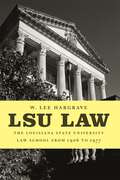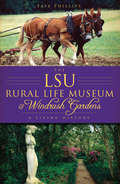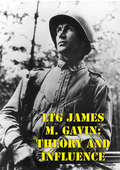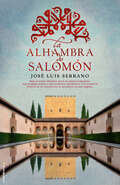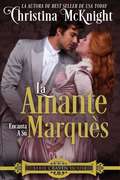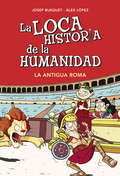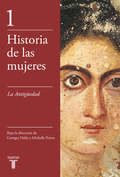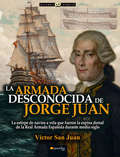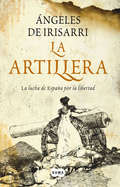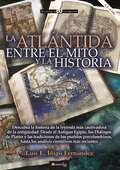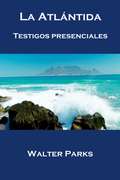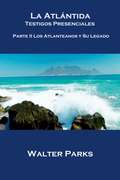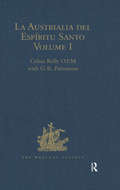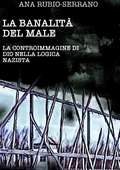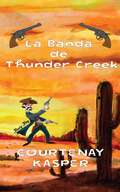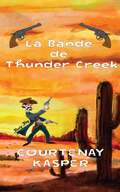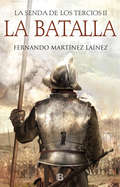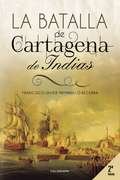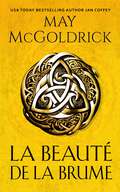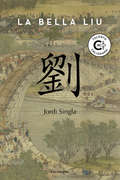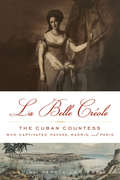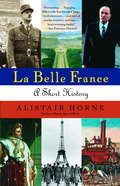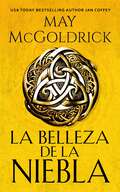- Table View
- List View
LSU Law: The Louisiana State University Law School from 1906 to 1977
by W. Lee HargraveFrom its founding in 1906, the Louisiana State University Law School has offered its students a truly distinctive legal education. Integrated programs in Louisiana’s unique civil law, in Anglo-American common law and federal law, and in international and comparative law create a global law curriculum recognized for both its academic excellence and its outstanding teaching, research, and public service faculty. In LSU Law, alumnus and professor W. Lee Hargrave chronicles the first seventy years of this institution—from its opening classes to the death of its longtime dean, Paul M. Hebert, and its transformation into an autonomous Law Center. He reveals the faces and forces that have helped to create the special mystique surrounding the school and the significance attached to a law degree from LSU.After an initial discussion of the legal profession in Louisiana before the establishment of formal academic instruction, Hargrave maps the school’s growth and development. He charts the organizational difficulties of the early years, reputation building in the twenties, politically influenced extravagance in the thirties, wartime challenges in the forties, return to normalcy in the fifties, steady growth in the sixties, and overcrowding in the seventies. Throughout, he explores all aspects of the school—its administrators and faculty, student body, shifting admission requirements, curriculum, grading system debates, influence on Louisiana’s legal community and state government, and much more. He also describes how students lived and learned during each era and discusses the effects of outside people and events—including Huey P. Long, World War II, and the civil rights movement—on the school. Hargrave tells the history of the LSU Law School in the context of changes that occurred in legal education throughout the United States, making his work of interest to legal historians and the national law school community. Alumni will also appreciate this detailed study of what has become a Louisiana institution.
LSU Rural Life Museum and Windrush Gardens, The: A Living History
by Faye PhillipsIn 1861, Louisiana settler William S. Pike established an incredible five-hundred-acre plantation seven miles from the heart of present-day Baton Rouge. His progeny continued to cherish the land for generations, all while pursuing unique and active lives. William Stephen Pike Burden Jr. became an amateur magician, and Ollie Brice Steele Burden, inspired by the formal gardens of Europe, designed Windrush Gardens. Today, the land is home to Louisiana State University's Rural Life Museum and houses rare collections of Louisiana folk life and working plantation materials. In this comprehensive history of LSU's beloved landmark, archivist Faye Phillips brings to life the hardships and toils, vision and determination of families in eighteenth- and nineteenth-century Louisiana.
LTG James M. Gavin: Theory And Influence
by Major Edward P. GavinThis monograph approached Lieutenant General James M. Gavin as a military theorist and explored his influence as the Army transitioned from World War II to the Cold War. Gavin's theory of future warfare required an army with capability in atomic and non-atomic warfare and he recognized the need for readiness for both limited peripheral wars and general war. His theory shaped his vision of the functions, organizations, and technology required to succeed in future conflicts. Gavin organized much of his writing around the concepts of mobility, firepower, and control that he felt were critical for future warfare. His influence shaped development of tactical nuclear weapons, missiles, air mobility, and organizational transformation following World War II and into the Cold War.Gavin's theory of future warfare, his understanding of the Soviet threat, and his concepts of firepower, mobility, and control informed his model of how the Army should organize for future warfare. He envisioned flexible division organizations, capable of fighting dispersed over significant depth, enabled by superior air and ground mobility to deliver firepower adequate prevail on future battlefields...The organization that epitomized Gavin's concepts was the air mobile division that developed from his sky cavalry concept. Gavin's advocacy for the air mobility concept and his specific actions to advance personnel and positions to build and refine sky cavalry and air mobility capabilities were key factors in the eventual development and acceptance of the airmobile division. While airmobile divisions and sky cavalry would likely have emerged without Gavin, his influence clearly advanced the ideas and shaped the form of the organizations.
La Alhambra de Salomón
by José Luis SerranoBajo la actual Alhambra laten un palacio legendario, una sinagoga mística y una residencia paradisíaca. Y la verdadera historia de su construcción se encuentra en estas páginas. Corre el año 1002. Tras la muerte del padre, la familia Nagrela llega a Córdoba, capital de Al Ándalus y la ciudad más grande del mundo. La historia de una época de esplendor y cultura. Una historia de amor y de luchas familiares. La historia de la construcción de la Alhambra de Granada.Allí establecen su negocio de plantas medicinales y remedios de espagírica. Samuel Nagrela, el segundo varón de la familia, cultiva el comercio y, al mismo tiempo, estudia la ciencia de los griegos, la jurisprudencia judía, el derecho musulmán, el Corán, la Biblia, el Tamud, la lengua aramea, la medicina hipocrática y un oficio que habría de cambiarle la vida: el de calígrafo de la lengua árabe.En el 1013 el ya rabino Samuel inicia su viaje de exilio, tras la guerra civil. Está convencido de que lo guía la Divina Providencia y de que algún día será príncipe de todos los judíos andalusíes. En ese viaje iniciático conocerá a Ilbia, una joven noble recluida en el castillo de Salobreña, con asombrosos conocimientos matemáticos y arquitectónicos, y que habría de convertirse en la mujer de su vida y en la artífice de su sueño: años más tarde, convertido ya en un hombre rico y poderoso, Samuel construirá el nuevo templo de Salomón.
La Amante Encanta a Su Marquès
by Christina McKnightEl nieto de un marqués poco convencional e hijo de una mujer desgraciadamente famosa, Elijah Watson, Marqués de Ridgefeld, ha pasado la mayor parte de su vida fuera de Londres. Su crianza atípica le ha dejado un profundo deseo de echar raíces y de llevar la vida de una familia tradicional, y está determinado a vivir más allá de todo reproche. Cuando conoce a la señorita Samantha Pengarden, cree que ha encontrado la mujer con la cual desea casarse –excepto que ella le tiene reservadas otras ideas mucho más sensuales. Conocida en la alta sociedad como la hija rebelde e ilegítima de la no muy respetable madama de la londinense Craven House, Samantha nunca antes había tenido que enfrentar al mundo sin su tímida gemela –hasta ahora. El casamiento de su hermana y el regreso del canalla de su padre la dejan sola y sin rumbo. Cuando Elijah accede a acompañarla a los sitios de la peor calaña de la ciudad, piensa que por fin ha encontrado un hombre con un gusto por el escándalo y el conocimiento de los asuntos de la carne. Pero nunca contó con que Elijah fuera tan honorable. Cuando el nombre de Samantha aparece como la amante del Marqués de Ridgefeld en una lista en el libro de apuesta del club de caballeros White, su reputación está en ruinas –y solo Elijah puede salvarla. ¿Podrán dos almas completamente opuestas unirse en un amor que es seguro durará por siempre?
La Antigua Roma (La loca historia de la humanidad #Volumen 2)
by Josep Busquet Àlex López¿Sabías que...En el Circo Máximo cabían más espectadores que en un estadio de fútbol?La mascota favorita de Julio César era una jirafa?En la Antigua Roma llegó a estar prohibido llevar pantalones?¡Descubre el mundo antiguo con LOS TEMPO, la familia más alocada y aventurera de todos los tiempos!INCLUYE:PasatiemposCómicsBastantes romanosAlgunos leonesMucho, mucho humor
La Antigüedad: La Antigüedad (Historia de las mujeres #Volumen 1)
by Georges DubyEsta obra busca analizar cómo las relaciones de los sexos condicionan la evolución de las sociedades y la necesidad de que las mujeres encuentren, al fin, su espacio propio. Esta Historia de las mujeres responde a la necesidad de ceder la palabra a las mujeres. Alejadas, desde la Antigüedad, del escenario donde se enfrentan a los dueños del destino, reconstruir su historia significa describir su lento acceso a los medios de expresión y su conversión en persona que asume un papel protagonista. Este análisis implica, asimismo, que las relaciones entre los sexos condicionan los acontecimientos, o la evolución de las sociedades. No se buscan conclusiones tajantes sino que las mujeres encuentren, al fin, su espacio propio. Tomando la periodización habitual y el espacio del mundo occidental, esta obra se divide en cinco volúmenes independientes pero complementarios. Este primer volumen trata de las funciones y roles sociales de las mujeres en la Grecia antigua y en Roma.
La Argentina
by María Sáenz QuesadaLa Argentina. Historia del país y de su gente, de María Sáenz Quesada, sintetiza el recorrido histórico que va desde la fundación de la sociedad colonial hasta nuestros días. Este singular relato historiográfico abarca la construcción de la República del siglo XIX, la gran inmigración y la prosperidad económica, la inestabilidad política en el siglo XX y la crisis de comienzos del milenio, la debacle del 2001 y el período de recuperación iniciado con las presidencias de Néstor Kirchner y Cristina Fernández. El texto, rigurosamente cronológico, consta de 74 capítulos pensados para ser leídos en forma independiente. Se organiza alrededor de los hechos políticos sobresalientes, pero incluye referencias a la vida privada, rasgos biográficos de los protagonistas, el clima de ideas y la sensibilidad de cada época, además de ejemplos para que el pasado se humanice y se vuelva más cercano y comprensible. Serio y entretenido a la vez, este libro se constituye en una obra indispensable para el conocimiento y el estudio de nuestra historia, y resulta un excelente auxiliar en la indagación de la identidad, un tema clave de nuestra cultura en el comienzo del tercer milenio.
La Argentina (Edición Corregida y Actualizada): Historia del país y de su gente
by María Sáenz QuesadaSáenz Quesada sintetiza el recorrido histórico y cronológico que vadesde la fundación de la sociedad colonial hasta la actualidad. Son 74capítulos pensados para ser leídos en forma independiente, que incluyenlos hechos políticos sobresalientes, pero también referencias a la vidaprivada, rasgos biográficos de los protagonistas, el clima de ideas y lasensibilidad de cada época, además de ejemplos para que el pasado sehumanice y se vuelva más cercano y comprensible. Este singular relato historiográfico abarca la construcción de laRepública del siglo XIX, la gran inmigración y la prosperidad económica,la inestabilidad política en el siglo XX y la crisis de comienzos delmilenio, la debacle del 2001y el período de recuperación iniciado conlas presidencias de Néstor Kirchner y Cristina Fernández.Serio y entretenido a la vez, este libro se constituye en una obraindispensable para el conocimiento y el estudio de la historiaargentina, y resulta un excelente auxiliar en la indagación de laidentidad.
La Armada desconocida de Jorge Juan (Historia Incógnita)
by Víctor San JuanDon Jorge Juan y Santacilia: Marino, ingeniero, explorador, científico, literato. Genio de la construcción naval. Descubra la gran aventura del diseño y construcción de estos avanzados navíos a vela y su participación en los episodios clave de la historia española de los Siglos XVIII y XIX. Una generación de buques injustamente olvidada que marcaron toda una época.Conozca la obra del ilustrado, científico, capitán de navío Jorge Juan, a través de su legado, medio centenar de navíos construidos entre 1751 y 1769, algunos de los cuales, como el Santísima Trinidad, Septentrión, Guerrero, Vencedor, Glorioso, Velasco, Princesa o Santiago de España, marcaron toda una época. Esta es su historia y, a través de ellos, del genio que los construyó. Estamos acostumbrados a considerar la figura del matemático, marino e ilustrado español Jorge Juan bajo el prisma histórico de su obra científica, sus aventuras en Iberoamérica, Inglaterra y Marruecos o su valor como representante de la ilustración española; pero nunca se ha hecho un inventario de la que fue su gran obra, los navíos que se construyeron bajo su dirección.
La Artillera
by Ángeles De IrisarriLa lucha de España por la igualdad. Agustina de Aragón, conocida como la Artillera, junto a la condesa de Bureta, Manuela Sancho, Casta Álvarez, María Lostal, María Agustín y la madre Rafols sobrevivieron en una ciudad en la que el cronista Casamayor escribió que los atacantes -más parecían Nerones que franceses-, en la que el último muerto dejaba enseguida de ser último en una sucesión aterradora. Estas mujeres y otras, y otros muchos hombres, sin nada que llevarse a la boca y rodeados de muertos, pues la peste hizo acto de presencia en Zaragoza en lo más crudo del invierno y del combate, quedaron inscritas con letras de oro en la Historia de España por sus heroicos hechos en defensa de la libertad. Ángeles de Irisarri recrea en esta novela el día a día de la guerra muros adentro de la ciudad a través de diez mujeres, unas reales, otras imaginarias, que representan a todas las clases sociales y que, al grito de «Vencer o morir», fueron capaces de tomar las armas y hasta disparar cañones.
La Atlántida (Historia Incógnita)
by Luis E. Íñigo FernándezEntre el mito y la historia. Descubra la historia de la leyenda más cautivadora de la antigüedad: Desde el Antiguo Egipto, los Diálogos de Platón y las ancestrales tradiciones de los pueblos precolombinos, hasta los más profundos análisis científicos recientes. La apasionante investigación histórica de los orígenes del mito de la Atlántida, desde los Diálogos platónicos, la tradición egipcia, griega y romana, las tradiciones ancestrales de los pueblos precolombinos, la evolución del mito en la Edad Media y Moderna y su influencia en los navegantes como Cristóbal Colon, hasta su relación con el género utópico en el renacimiento y su diversificación en el siglo XIX: Julio Verne, Donnelly, madame Blavatsky, Edgar Cayce, el enfoque étnico supremacista de la Alemania nazi y los mitos de las otras Atlántidas, como Mu o Lemuria. La Atlántida es, quizá, el mito por excelencia de la cultura occidental en los últimos siglos. Para muchos, no existió nunca más allá de la imaginación de Platón, que quiso valerse de ella para enseñar una lección de política a sus seguidores; para otros su existencia fue tan real como la de cualquier otra de las grandes civilizaciones de la Antigüedad.
La Atlántida Testigos Presenciales
by Silvana Borghi Walter ParksANTIGUOS DOCUMENTOS, RESTOS Y UTENSILIOS PROVENIENTES DE LA ATLÁNTIDA PRUEBAN SU EXISTENCIA. ¿MITO O REALIDAD? Muchos creían que la Atlántida fue una novela de ficción creada por Platón. Puesél no fue el primero en escribir sobre ella. Hemos encontrado un documento anterior a los escritos de Platón, proveniente del año 9619 A:C:, más de 9000 años antes del escrito por Platón. Además, hemos reunido suficiente evidencia en cuanto a los hallazgos arqueológicos y a los hechos científicos para proporcionar pruebas convincentes de que la Atlántida existió realmente. Y hemos encontrado los restos. Estructuramos la evidencia de respuestas 3 preguntas básicas: ¿Cómo se creó la Atlántida; tuvo que dejar evidencia, o una herencia; ¿cómo fue destruida? Lo invito a adentrarse a este mundo de las antiguas sociedades y los escritos antiguos. Vayamos y descubramos la Atlántida.
La Atlántida Testigos Presenciales Parte II Los Atlanteanos y Su Legado
by Walter Parks Cinthia Noemi MascarellMuchos han creído que la Atlántida es una historia de ficción creada por Platón. Bien, pues Platón no fue el primero en escribir sobre ella. Hemos encontrado un documento mucho más antiguo. Fue escrito en el año 9619 AC, alrededor de 9250 años antes de los escritos de Platón. Además, hemos reunido evidencias científicas y arqueológicas suficientes para constatar que la Atlántida fue real. Y hemos hallado sus restos. Organizamos la evidencia como respuestas a 3 preguntas básicas: ¿cómo fue creada la Atlántida?, ¿dejó evidencia de su existencia o un legado?, ¿Cómo fue destruida? Este libro electrónico es la parte II.
La Austrialia del Espíritu Santo: The Journal of Fray Martin de Munilla O.F.M. and other documents relating to The Voyage of Pedro Fernández de Quirós to the South Sea (1605-1606) and the Franciscan missionary plan (1617-1627)
by Celsus Kelly O.F.M G. R. ParsonsonPedro Fernández de Quirós was a remarkable navigator and explorer. Having sailed in 1595 as chief pilot in the ill-fated Spanish expedition to the Solomon Islands, he returned to the 'Austral Lands' - the area of the New Hebrides - in 1605 with another expedition, which is the subject of this volume. In his Introduction Father Kelly sets out to resolve some of the outstanding historical problems of this Quirós expedition in the light of recently discovered documents. At the same time he gives a brief description of the Franciscan missionary apostolate, its contribution to geographical discovery in the Pacific, and its missionary plans for the natives of the Austral lands. He also provides a systematic survey of source material in Spanish, Roman and other European archives. The volume contains 32 documents concerning the 1605 expedition, including Munilla's Relación, as well as the Franciscan Missionary Plan. All these have been translated by Father Kelly. Continued in Second Series 127, with which the main pagination is continuous. This is a new print-on-demand hardback edition of the volume first published in 1966.
La Banalità del Male: La Controimmagine di Dio nella Logica Nazista
by Ana Rubio-SerranoL'obiettivo di questo libro non è mostrare soltanto l'Auschwitz storico, ma piuttosto l'Auschwitz che si è radicato nell'essere umano: la non capacità di distinguere il bene dal male; l'offuscamento per riaffermare la propria identità come la sola umana e l'impossibilità di pensare l'alterità, in modo tale che tutto questo ancora oggi persiste come eredità, della quale il nostro mondo è tanto esecutore testamentario quanto erede. Auschwitz è quindi il punto di partenza ma non il punto di arrivo. È uno studio in cui si mostra il modello di anti-uomo che nasce dall'antropologia nazista contraria al modello di uomo che rivela l'antropologia cristiana. Pubblicazione parziale della sua tesi di dottorato.
La Banda De Thunder Creek
by Courtenay KasperCuenta la historia de Ridge, un niño y su familia, y cómo encontró a Dios a través de su vida como abuelo
La Bande de Thunder Creek
by Courtenay KasperRidge Jones, onze ans, et sa sœur jumelle Libby découvrent que leur grand-père n’est pas le shérif qu’ils croyaient, ce qui les entraîne dans une aventure de la ruée vers l’or, de Cache Creek à Barkerville. Les jumeaux, terrifiés par les hors-la-loi tels que Rusty Roy, Bad Barry et leur bande ridicule de braqueur de trains, doivent se ruer à Barkerville avant qu’il ne soit trop tard pour sauver leur famille. Un aventure en pleine conquête de l’Ouest, avec de l’espoir, de la foi, et une chèvre insolente. Une histoire qui vous redonnera le sourire et l’espoir dans les moments difficiles !
La Batalla (La senda de los Tercios #Volumen 2)
by Fernando Martínez LaínezSegunda entrega de la serie de novela histórica de Fernando Martínez Laínez en la que relata la historia novelada de uno de los ejércitos más importantes de todos los tiempos: los Tercios de Flandes. Una obra con una labor de documentación impresionante y de rigor histórico colosal Este segundo volumen de la trilogía «La senda de los Tercios» se centra en la batalla de Nordlingen (1634), en la que las tropas del cardenal-infante don Fernando aplastaron al ejército luterano sueco, considerado hasta entonces invencible, en la Guerra de los Treinta Años. La crítica ha dicho:«Fernando Martínez Laínez regresa con su últimanovela a uno de los periodos que mejor conoce, el siglo XVII español.»Óscar Medel, La Aventura de la Historia
La Batalla de Cartagena de Indias
by Francisco Javier Membrillo BecerraUn trabajo objetivo sobre el sitio y ataque de la ciudad de Cartagena de Indias en 1741. <P><P>En octubre de 1739, con la excusa del incumplimiento de los acuerdos comerciales obtenidos en América por el tratado de Utrech, Inglaterra declara la guerra a España y ello le da la excusa para intentar la conquista de las posesiones españolas en el Nuevo Mundo. <P><P>Para ello, los británicos alistan tres escuadras con un importante contingente terrestre para asaltar los enclaves españoles americanos. La Batalla de Cartagena de Indias narra el desarrollo secuencial y pormenorizado de los acontecimientos en los que se implicaron los diversos contendientes (españoles, colombianos , británicos, norteamericanos y franceses), desde el comienzos del siglo XVIII hasta la batalla principal en la ciudad de Cartagena de Indias durante 1741, así como muestra en toda su plenitud los fuertes caracteres del virrey de Nueva Granada, Sebastián de Eslava; el del tuerto, cojo y manco marino español Blas de Lezo, y el del vicealmirante inglés Edward Vernon, actores principales de los hechos. <P><P>En esta 2ª edición se ha incluido, además, algunas aclaraciones y opiniones acerca de las últimas publicaciones noveladas de los hechos.
La Beauté de la Brume (Famille Macpherson)
by Jan Coffey May McGoldrickAuteur de best-sellers USA Today Un rude Highlander envoyé pour récupérer la fiancée de son roi trouve une mystérieuse beauté à la dérive en mer... Maria avait été forcée de se marier à dix-sept ans et s'était retrouvée veuve peu de temps après. Aujourd'hui, cinq ans plus tard, son frère lui a choisi un autre mari sans la consulter : le jeune roi d'Écosse. Maria, qui n'a jamais connu ni passion ni amour, refuse de se soumettre et jure de fuir vers la liberté. Mais le navire qu'elle a choisi pour s'échapper a sombré dans le brouillard, abandonnant la belle aux cheveux noirs à la merci du vent et des marées, vers un destin bouleversant. C'est le chef des Highlands, John Macpherson, en route justement pour ramener la future épouse de son roi, qui sauve la belle Maria à la dérive en mer. Presque instantanément, une irrésistible attirance s'installe entre eux. Maria savoure ces quelques jours volés, consciente que leur amour ne pourra jamais durer une fois que son fier Highlander aura découvert sa véritable identité. Maria savait que si suivre son cœur pouvait la libérer, elle risquait également de mettre en péril la vie de celui qu'elle aime...
La Bella Liu
by Jordi SinglaLa injusticia fortaleció su espíritu, la humillación la hizo invulnerable, y se enfrentó a una época. China, siglo X. Encadenado en el cuarto oscuro, con una guerra civil en ciernes, el joven Shang Yang se aferra a una pequeña oportunidad. En la sitiada ciudad de Taiyuan, el licenciado Liu debe abandonar un reino condenado en busca de un futuro y emprende un viaje en el que le acecha una muerte terrible. Una doncella marcada por la desgracia sufre humillación e injusticia en una época en que una mujer lo tiene todo prohibido. Su espíritu es inquebrantable y su inteligencia ávida, pero a veces esto no basta. No todo es lo que parece ser. Guerras, juegos de alcoba y luchas por el poder, virtudes y bajezas, historias de gente grande y de gente pequeña.
La Belle Créole: The Cuban Countess Who Captivated Havana, Madrid, and Paris
by Alina García-LapuertaThe adventurous woman nicknamed La Belle Créole is brought to life in this book through the full use of her memoirs, contemporary accounts, and her intimate letters. The fascinating María de las Mercedes Santa Cruz y Montalvo, also known as Mercedes, and later the Comtesse Merlin, was a Cuban-born aristocrat who was years ahead of her time as a writer, a socialite, a salon host, and a participant in the Cuban slavery debate. Raised in Cuba and shipped off to live with her socialite mother in Spain at the age of 13, Mercedes triumphed over the political chaos that blanketed Europe in the Napoleonic days, by charming aristocrats from all sides with her exotic beauty and singing voice. She married General Merlin in Napoleon's army and discussed painting with Francisco de Goya. In Paris she hosted the city's premier musical salon where Liszt, Rossini, and great divas of the day performed for Rothschilds, Balzac, and royalty. Celebrated as one of the greatest amateur sopranos of her day, Mercedes also achieved fame as a writer. Her memoirs and travel writings introduced European audiences to 19th-century Cuban society and contributed to the debate over slavery. Mercedes has recently been rediscovered as Cuba's earliest female author and one who deserves a place in the canon of Latin American literature.
La Belle France
by Alistair HorneLa Belle Franceis a sweeping, grand narrative written with all the verve, erudition, and vividness that are the hallmarks of the acclaimed British historian Alistair Horne. It recounts the hugely absorbing story of the country that has contributed to the world so much talent, style, and political innovation. Beginning with Julius Caesar’s division of Gaul into three parts, Horne leads us through the ages from Charlemagne to Chirac, touring battlefields from the Hundred Years’ War to Indochina and Algeria, and giving us luminous portraits of the nation’s leaders, philosophers, writers, artists, and composers. This is a captivating, beautifully illustrated, and comprehensive yet concise history of France. From the Trade Paperback edition.
La Belleza de la Niebla: Una mujer valiente. Un guerrero escocés. Un amor imposible. (La Familia Macpherson)
by Jan Coffey May McGoldrickUn guerrero de las Highlands en una misión real. Una mujer misteriosa que huye de una vida que no eligió. Un encuentro decisivo que cambiará sus destinos para siempre. María ha conocido muy poco la libertad… y nada del amor. Casada a los diecisiete años y viuda poco después, ahora se enfrenta a otro matrimonio arreglado, esta vez con el joven rey de Escocia. Desesperada por recuperar su vida, María escapa a bordo de un barco sin rumbo… solo para ser atrapada por una tormenta que destruye sus planes y su embarcación. A la deriva y sola, es rescatada por el rudo jefe de clan John Macpherson, un hombre comprometido con el deber y el honor. Está en camino para recoger a la prometida de su soberano, sin saber que la cautivadora mujer que ha salvado del mar es, precisamente, la mujer que debía escoltar. Mientras recorren valles envueltos en niebla y montañas escarpadas, nace entre ellos un vínculo poderoso—peligroso, innegable y prohibido. Pero los secretos no pueden permanecer ocultos para siempre. Cuando la verdad salga a la luz, María deberá tomar una decisión: seguir su corazón y arriesgar la vida de John… o sacrificar el amor por el bien de la corona. Ambientada en el sobrecogedor paisaje del mar y la Escocia medieval, esta historia épica de amor, identidad y honor cautivará a los amantes del romance histórico lleno de emoción y profundidad.
